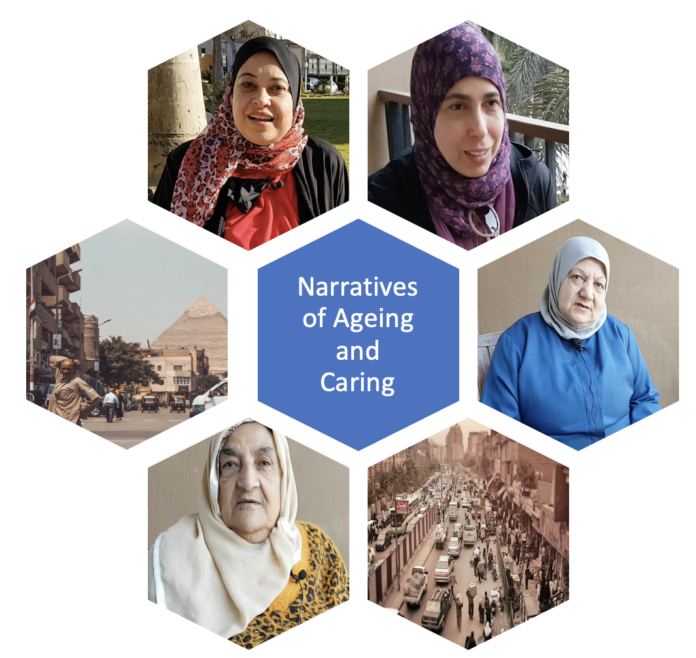The Middle East and North Africa region is experiencing a fast demographic change, including population ageing. For countries to be able to create a suitable environment and opportunities for older people and their families, there is a need for detailed research and data. More importantly, the voices of older people themselves and their informal carers, which are often missing, need to be heard and considered. As part of the MENARAH engagement activities, Professor Shereen Hussein conducted several video interviews with older people and informal carers in Cairo in 2020. In this blog, we present a few case studies to highlight some of the aspiration, concerns and challenges faced by older people and informal carers in the region.
Hayat is an 80 years old lady who lives alone in her flat in centre Cairo. She worked as a headteacher before retirement and was widowed years before then. She has two grown-up children, one lives abroad, and one lives in Cairo but further away from her. Hayat highlights the importance of the wider community and the social capital she built during her working life as she ages. She hopes for opportunities tailored for older people to intellectually engage with and maintain interest as well as to capitalise on her experience. She also talks about the importance of intergenerational exchange and its value to both older and younger generations.
Intergenerational support is particularly crucial in a region experiencing a simultaneous fast and steep growth of older age groups while observing a ‘youth bulge’ with large cohorts of the young adult group. These demographic challenges also create opportunities, especially in societies where the intergenerational exchange is part of its life fabric, as explained by Hayat.
Ghada is a mother of three young adults, one of the twins was born with cerebral palsy which requires round the clock care and support. She used to live with her family in a district further away from her widowed mother’s apartment. Several years ago, her mother needed more care and support and Ghada and her family decided to move in a flat next to her mum’s to be able to support her as well as her own family. Ghada speaks about the lack of support to family carers both in terms of information and training as well as practical support like respite care. She also highlights the cultural norms around stigma associated with certain types of care provisions and the various burdens she is expected to juggle.
Caring for older people remains a family matter across the region, particularly for younger women in the family. Thus, supporting the whole family unit and creating ways to facilitate intergenerational exchange and promote women’s contribution to the labour market and the wider society have positive and tangible economic and societal returns.
Nadia is a 78 widow who lives alone; she has three grown-up children, two live abroad. Nadia highlights the importance of community organisations in creating opportunities for older people to socialise, including going on trips. She emphasises the importance of technology and how this is keeping her involved with her grandchildren, albeit at a distance.
However, Nadia explains that there are limited local opportunities for older people to engage with and called for well-designed clubs and parks for older people to use. She also speaks about how transports, infrastructure and the physical environment -including streets’ layout and pavements – are not designed with older people in mind. The unsuitable infrastructure hinders the opportunity for older people to even go for regular walks to maintain their physical health.
Rania and her sisters, who are all engineers, had their lives changing entirely in an attempt to care for their parents properly. They faced particular challenges to support their mother, who has developed some mobility issues. Rania talks about the layered difficulties they face on a day to day basis from financial to emotional struggle. She highlights how the environment and infrastructure are not suitable for people with physical disabilities, which makes going out for a wheelchair user almost impossible. Rania also discusses the lack of opportunities for older people to participate in various social and economic activities. She provides the example of her father, who has considerable capabilities but is not enabled to make use of them.
Older people themselves bring considerable benefits to the family and society. Evidence from other regions shows that older people play instrumental roles in supporting younger generations. From financial help to in-kind support through the provision of much-needed child care or accommodations on top of endless emotional support. Older people also have valued professional and personal expertise; thus, creating opportunities for older people to participate outside of the family sphere would bring added value to the whole society.
The MENARAH network emphasises the importance of healthy ageing in its broadest meaning, to include physical, psychological and social aspects. A core part of this is the creation of accessible opportunities for older people, from various walks of life, to participate effectively in more comprehensive economic and social activities. Such opportunities should acknowledge, and attempt to counter the impact of, the cumulative disadvantages over the life course of different groups of people.
Founder and Director
Shereen Husseinis a Health and Social Care Policy professor at the London School of Hygiene and Tropical Medicine (LSHTM), United Kingdom.
Shereen Founded the MENARAH Network in 2019, through an initial grant from the Global Challenge Research Fund, UKRI. She is a medical demographer with expertise in ageing, family dynamics, migration and long-term care systems. Shereen regularly collaborates with the United Nations, the World Health Organisation and the World Bank in policy and research focused on ageing in the Middle East and North Africa Region.
Shereen received her undergraduate degree in statistics and a postgraduate degree in computer science at Cairo University. She completed an MSc in medical demography at the London School of Hygiene and a PhD in quantitative demography and population studies at the London School of Economics and Political Science, United Kingdom.



